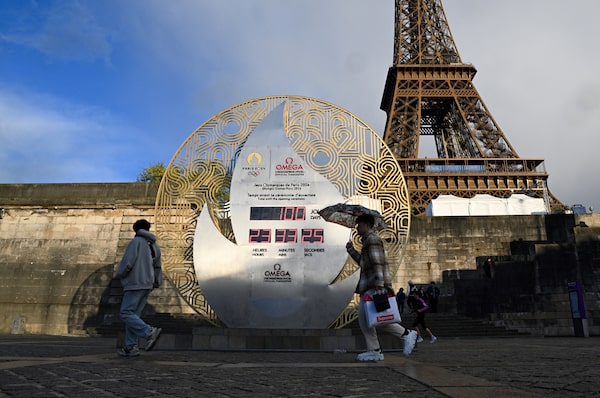
A countdown clock for the Paris 2024 Olympic Games indicates 100 days before the start of the opening ceremony, in front of the Eiffel Tower in Paris, on April 16.STEFANO RELLANDINI/Getty Images
The organizers of the 2024 Olympic Games in Paris are pressing ahead with ambitious plans to hold the opening ceremony on the River Seine despite comments from French President Emmanuel Macron that the event may have to be scaled back because of security concerns.
French officials remain determined to showcase the capital by staging the ceremony outside the main stadium for the first time. Athletes from 205 delegations will travel along a six-kilometre section of the Seine in a flotilla of 90 boats. The route passes through the heart of Paris, starting at the Austerlitz bridge near the Jardin des plantes and heading west past the Notre-Dame Cathedral to the Trocadéro, across the river from the Eiffel Tower.
“Our main objective with these ceremonies is to magnify our vision for Paris 2024 to offer an accessible and open experience to everyone by placing the Games at the heart of the city,” said Marie-Catherine Ettori, the director of ceremonies. “For one evening, the Seine will be transformed into a giant, open-air stadium. That’s our ambition.”
Ms. Ettori told reporters during a briefing Thursday that the July 26 ceremony will last nearly four hours – from 7:30 p.m. local time to 11:15 p.m. – and include several music and dance performances on some of the city’s famous landmarks. It will also combine the traditional parade of athletes with artistic segments “to offer more rhythm, more surprises.”
Some 320,000 spectators will line the riverbank, and there will be 100 giant screens set up along the way to broadcast the ceremony.
Ms. Ettori did not address security measures, but questions have been mounting lately about whether the ceremony will be able to go ahead as planned. Organizers have already had to cut back the number of spectators, and this week Mr. Macron said further changes could be coming if the threat of terrorism increases.
Heading to the Paris Olympics? Here’s where to go and what Canadians to watch for
France raised its security readiness to the highest level last month after an attack at a Russian concert hall killed more than 140 people. An offshoot of the Islamic State has claimed responsibility for the massacre, and the same group is believed to have targeted France. The wars in Gaza and Ukraine have also increased global tensions, which could spill over into the Olympics.
All of this could force organizers to scrap the open-air extravaganza, Mr. Macron said.
“If we think there are risks, depending on our analysis of the context, we have fallback scenarios. There are plan Bs and plan Cs,” he told a caller during a phone-in show on French television Monday. He added that the alternative plans include limiting the ceremony to the Trocadéro complex or reverting to a more traditional event in the national stadium.
However, Mr. Macron and other officials have insisted they are determined to stick to the original plan. “This opening ceremony is a world first. We can do it and we are going to do it,” he said.
Sports Minister Amélie Oudéa-Castéra also said this week that there was no specific terror threat to the ceremony and that the public will be safe during the Games. “We know the world is complex, sometimes unstable, sometimes unpredictable, sometimes dangerous,” she told reporters. “We really want to say to the whole world that, in any case, France will be a safe place.”
About 15,000 soldiers and 35,000 police officers are expected to be deployed during the Games, along with 2,500 security officers from various countries. French airspace will be closed during the opening evening, and sections of central Paris near the river will be cordoned off a week before the Games begin. Media covering the opening ceremony will have to carry two levels of passes to enter spectator zones along the river.
City officials had initially called for a far more accessible opening ceremony with as many as two million people watching the celebration for free along the riverbank. That figure was later slashed to 600,000, then to 326,000 ticketed places earlier this year. Of that total, 104,000 tickets will be sold to the public, with the remainder distributed for free to community groups across France.
Generating public enthusiasm for the Games has also proved challenging for organizers.
In a recent survey of 1,013 French adults for Europe 1 radio, 52 per cent of respondents said France was not prepared for the Olympics. Another poll last month by the Viavoice group found that 57 per cent of respondents felt “little” or “no” enthusiasm for the Games, which are expected to cost the government at least €8.8-billion ($12.9-billion).
The lack of excitement has frustrated Mr. Macron and other officials who argue that similar concerns emerged in the run-up to other Olympics, such as London in 2012, which went on to be embraced by the public.
“Take a little perspective and look at the history of previous Games,” Mr. Macron said this week.
With 100 days to go before the Paris 2024 Olympics kick off, Olympic venues in Paris, other parts of France and Tahiti are getting ready to welcome the world's biggest sporting event.
Reuters
 Paul Waldie
Paul Waldie